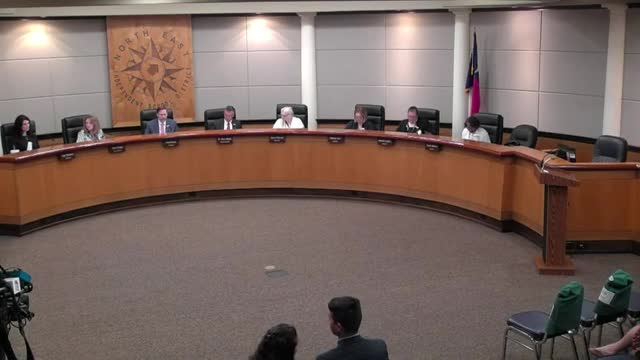NEISD trustees defend local cell-phone policy after TEA inquiry over House Bill 1481
Get AI-powered insights, summaries, and transcripts
Subscribe
Summary
Trustees and the superintendent told a packed Northeast ISD meeting they developed a locally tailored cell-phone rule that bars use during instructional time but allows phones at passing periods and lunch; the district has responded to a Texas Education Agency inquiry and is awaiting a finding.
Northeast Independent School District trustees on Wednesday defended a locally developed cell-phone policy that restricts student use during instructional time but allows phone access during passing periods and lunch, saying the rule was shaped by parents, students and staff and is currently the subject of an inquiry by the Texas Education Agency.
The trustees heard more than a dozen parents and community members during a lengthy discussion of House Bill 1481, which governs student use of personal communication devices. Several speakers told trustees the district’s approach strikes the right balance between minimizing classroom distraction and preserving family communication. “My children aren't allowed to use cell phones during instructional time, which supports their learning. But they can text during lunch and passing periods and that flexibility matters to my family,” parent Shakita Gresham said during public comment.
The board placed the item on the agenda after receiving a letter from TEA dated Sept. 24 notifying the district of a review; the district responded to TEA on Oct. 1, according to Board President Beyer and Superintendent Dr. Micah. The TEA letter describes a “notice of an alleged violation” alleging the district’s policy conflicts with the statute; the district’s response argues its policy is a lawful local definition of the undefined terms in the law. "It stands as an alleged violation — there has been no violation," Dr. Micah said, calling TEA’s notice a procedural step and noting that the agency has not issued a final finding.
Superintendent Dr. Micah told the board the district began restricting phones at some campuses before HB 1481 became law, after principals and parent groups worked with students to create campus-specific approaches. "We started restricting cell phones long before House Bill 1481 was passed," he said, noting that 16 schools piloted locally developed policies last year after community meetings. The superintendent said those pilots generally produced few complaints and that staff reported improved student focus.
Several parents urged trustees to retain local control. “This is about who gets to decide how our schools are run,” parent Katie Wilkie said. “The power belongs right here in this room, not in Austin.” Another parent, Jaree Williams, asked the board to consider accommodations for students with documented emotional or medical needs who may require limited, discreet phone access to self-regulate.
Board members asked district counsel and staff for clarifications about the district handbook and emergency communications. Board Secretary Thompson asked whether the district allows students to use the office phone in emergencies; staff and trustees said that practice remains in place and campus staff also may authorize a student to go the office for a call. District counsel explained TEA’s position: the agency interprets the statute to require a ban “bell to bell” (from the start to the end of the school day). The district’s legal response argues the legislature left key terms undefined and that existing education-code principles reserve unspecified local decisions to the local board.
No policy change was adopted at the meeting. Trustees voted at other points in the agenda on unrelated policies. Board members said they will wait for TEA’s formal finding before taking further action. "We're in a holding pattern waiting to hear back from the agency," Dr. Micah said. "Once we hear, we'll let the community know and the board will make a decision."
The exchange followed letters from state legislators urging stricter enforcement; Senator Donna Campbell’s correspondence was cited during the discussion. Trustees repeatedly framed the issue as a balance between classroom learning and parental communication, and several said their constituent feedback favored maintaining the current local policy while staff pursue dialogue with TEA.
The board requested the district continue to provide updates and said staff should keep working with principals, parents and student leaders to refine campus-level procedures and to document any concerns or conflicts that may arise while the TEA review proceeds.
The board did not authorize litigation or a policy change at the meeting; it voted instead to await TEA’s next action and to keep the community informed.
